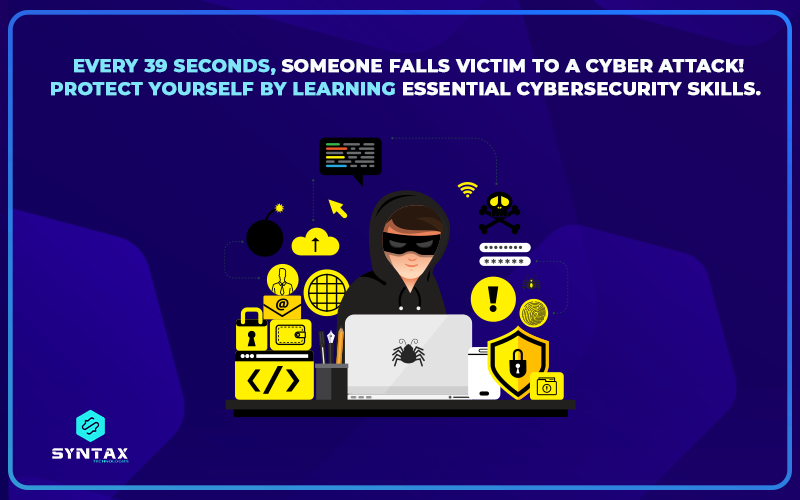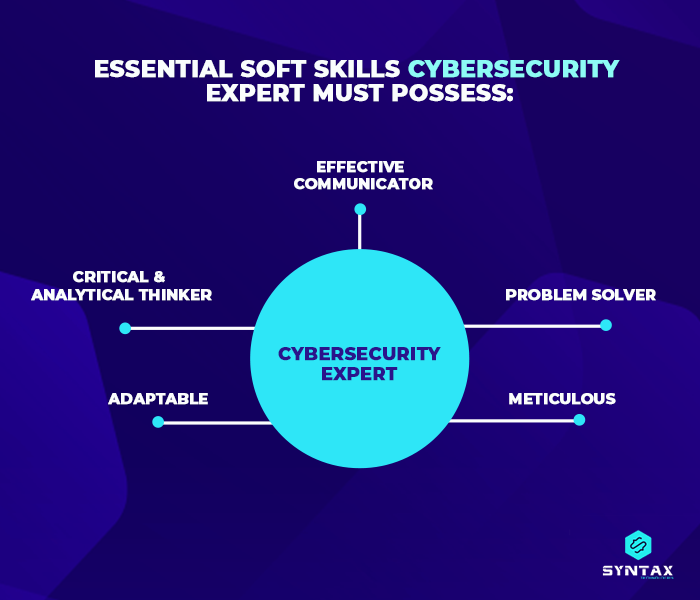
Cybersecurity is an increasingly important field in modern technology, and experts in this area are highly sought after. To become a cybersecurity expert, you need to have a wide range of skills from technical knowledge to interpersonal relationships.
In this blog post, we'll be discussing the 15 most essential skills needed for becoming a cybersecurity expert. Read on to learn more about the essential knowledge and abilities that you need to acquire to become a cybersecurity expert.
15 MOST ESSENTIAL SKILLS TO BECOME A CYBERSECURITY EXPERT

-
Networking & System Administration
Cybersecurity professionals must possess both networking and system administration capabilities to be successful.
Networking requires the ability to configure and maintain computer networks, while system administration involves maintaining systems operating on those networks.
Networking and system administration are two fundamental skills that grant cybersecurity professionals the power to construct, secure and preserve a secure network infrastructure.
By leveraging these abilities, they can safeguard data from any potential breaches, malicious intrusions or thefts.
To gain the essential skills of networking and system administration, one can pursue a variety of pathways such as attending technical schools or boot camps, taking an Online Cyber Security Training Course, or pursuing certification programs.
-
Risk Assessment & Management Skills
Cyber Security experts must possess the skill to assess and manage risks to design and develop effective Cyber Security solutions.
Risk Assessment & Management is a critical Cyber Security skill, allowing Cyber Security professionals to accurately identify potential threats, analyze these risks and then take appropriate countermeasures.
The risk analysis process involves examining data sources and security systems to determine what exposures are present, where vulnerabilities exist, and how they could be exploited by malicious actors. Once identified, Cyber Security professionals use the risk assessment information to create plans for improving Cyber Security measures that protect businesses from damaging cyber-attacks.
Programming Skills are essential Cyber Security skills needed to deploy and maintain Cyber Security systems.
Coding and understanding programming languages such as C, C++, JavaScript, PHP, HTML, SQL(Structured Query Language), and Python are key components that enable Cyber Security professionals to effectively create and manage Cyber Security applications.
With these programming skills, Cyber Security professionals can check encryption systems, build authentication tools and develop Cyber Security policies more efficiently.
Without a basic knowledge of coding and the associated programming languages, it would be difficult to implement Cyber Security protocols successfully.
Security Auditing is an important Cyber Security skill that involves assessing the security protocols of a network or computer system to check its vulnerability. Cyber Security professionals with such skills can put into practice the key competencies required to protect online resources from ever-evolving threats, as well as evaluate current security policies within organizations and recommend improvements.
According to many Cyber Security experts, security auditing will become even more important to both safeguard current Cyberinfrastructure, and further build Cyber resilience; however, it is also crucially important for the reliability and safety of organizations’ data.
Network security control refers to the ability to protect an organization's digital assets from unauthorized access and malicious activities. This includes preventing intrusions, ensuring data integrity, and mitigating threats when they occur.
Cybersecurity experts must be knowledgeable in the art of defending networks and securing data, which often begins with basic security tools such as antivirus software, firewalls, and intrusion detection systems.
Cloud Security is an important Cyber Security skill that ensures the security of data, applications, and cloud computing environments.
Cyber security professionals need to be able to understand how to identify, respond to, and protect data from a variety of external threats according to the type of technology being used (public cloud, private cloud, hybrid cloud). This kind of Cyber Security skill ensures that data is kept secure and free from vulnerabilities that can leave it exposed.
Cloud security skills also involve making sure all cloud components are backed up so any malicious activity or disruption can quickly be recovered.
An Intrusion Detection System (IDS) actively monitors related networks and systems to detect malicious network traffic and behavior such as infiltrations to confidential data, denial-of-service attacks, and potential worms or viruses that may turn into greater threats if not addressed.
It can spot weak points in Cyber Security protocols where unauthorized access could become a risk, allowing Cyber Security professionals to take proactive measures before any infiltration does occur.
Being proficient with intrusion detection software, such as Security Information and Event Management (SIEM) products, Intrusion Detection Systems (IDS), and Intrusion Prevention Systems (IPS), helps Cyber Security experts pinpoint any suspicious behavior or security breaches without delay.
-
Computer Forensics Skills
Computer Forensics Skills are the ability to analyze computer data to retrieve digital evidence associated with cybercrime and malicious network activity.
It is a critical Cyber Security Skill as digital evidence can play a key role in understanding how an attack occurred, identifying those behind the attack, and providing tangible proof of a crime in court or other legal proceedings.
With expertise spanning from network traffic analysis, forensic data recovery and understanding the capabilities of the malware, Cyber Security experts who understand the intricacies of computer forensics can be invaluable in preventing cyber-attacks.
Blockchain Security has emerged as a vital Cyber Security skill due to its highly secure system for securing digital data and transactions.
Blockchain builds on cryptography to create an immutable, distributed ledger of data that provides visibility and traceability over transactions to ensure full transparency between parties.
As such, the ability to understand the security capabilities of blockchain technology and apply those principles in Cyber Security-related tasks can provide a competitive edge in many situations.
-
Internet of Things Security
One emerging CyberSecurity discipline is Internet of Things (IoT) security which empowers organizations to protect their connected technologies and inter-connected devices, such as smartphones, printers, laptops, webcams, home automation systems and smart electrical meters. Through the implementation of IoT security measures, businesses prioritize the safety of connected devices and reduce exposure to potential cyber-attacks.
In a wider context, IoT security also seeks to protect data transmission between networks, maintain secure authentication practices, enable and exploit software updates, and enable secure system design.
-
Proficiency in Operating Systems and Virtual Machines
For cybersecurity professionals, having a thorough understanding of operating systems and virtual machines is essential, as they are two primary entry points for malicious actors.
The ability to configure an operating system or virtual machine with robust cyber security measures is essential in preventing hackers from gaining unauthorized access to sensitive data.
Cyber security skills such as understanding the architecture of operating systems, implementing practices to secure an information system, and knowing how viruses could infiltrate a system are all examples of the abilities gained from mastering this knowledge.
-
Artificial Intelligence (AI)
Artificial Intelligence (AI) has become an important Cyber Security skill for Cyber Security professionals due to its ability to swiftly detect anomalies in data structures, proactively respond to attacks in real time, and uncover malicious activity that traditional Cyber Security solutions may miss.
As Cyber Security continues to become an increasingly critical component of modern society, having an understanding of Artificial Intelligence-based Cyber Security processes is essential for Cyber Security professionals.
Penetration testing, also known as ethical hacking, is a critical cyber security skill as it allows organizations to identify vulnerabilities in their IT infrastructure before malicious hackers can exploit them.
These tests are invaluable for discovering any gaps that attackers may find entry points into, along with any unintentional access pathways that have been left open by careless administrators or users.
Cybersecurity professionals with experience in penetration testing go a long way in mitigating risks that could lead to catastrophic cyber incidents.
Having a clear understanding of the Cyber Security Incident Response Plan is important for preparing infrastructure for cyberattacks and reacting swiftly in the event of an incident.
By having a thorough knowledge of the challenges and protocols associated with Cyber Security Incident Response Plans, they will be better equipped to accurately diagnose incoming threats and efficiently respond to developing problems that could cause an attack or breach.
To properly resolve incidents, one must both be aware of their organization's incident response plan and possess the necessary digital forensics and malware analysis skills.

To excel as a cybersecurity professional, one must possess both technical acumen and interpersonal abilities.
Some of the Essential Soft Skills that a Cybersecurity Expert Needs to develop are communication skills, problem-solving skills, Critical & Analytical Thinking Skills, Ability to adapt and pay attention to details.
Conclusion
All in all, there is no doubt that possessing an extensive knowledge of Cyber Security Skills is fundamental for any cybersecurity expert.
If you're looking to excel in the cybersecurity sector, you must build both technical and transferable skills.
All these abilities combined can help create a well-rounded cybersecurity professional who is prepared to protect their organization from any potential cyber threats.
Begin honing these vital skills. Today!
 icons at the top right corner of the subsection.
icons at the top right corner of the subsection.